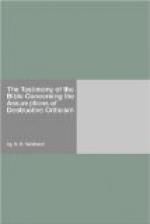It is Ezra, not the critics, who informs us that this was “written in the law of Moses the man of God.” We will be pardoned for accepting the testimony of Ezra. He does not mean to forsake his faith in the Mosaic authorship of the Pentateuch, for he writes in chapter vi. 18: “They set the priests in their divisions, and the Levites in their courses, for the service of God, which is at Jerusalem; as it is written in the book of Moses.”
In the eighth chapter of the book of Nehemiah, that great servant of God affirms his faith in the Mosaic authorship of the Pentateuch, which was also the faith of all the people of his time. In the first verse in this chapter he informs us that “all the people gathered themselves together, as one man, into the street that is before the water gate, and they spake unto Ezra the scribe to bring the book of the law of Moses, which the Lord had commanded to Israel.” Ezra was not to make a book and call it the book of Moses, as some of the critics teach, but to “bring the book of the law of Moses,” a book in their possession already made, and with which they were already familiar—“The Book of the Law of Moses.”
“The Book of the Law of Moses” was the Jewish title given to the Pentateuch at that time, and is so recognized again and again. Nehemiah viii. 14 affirms again: “They found written in the law, which the Lord had commanded by Moses, that the children of Israel should dwell in booths in the feast of the seventh month.” Nehemiah quotes this “command of the Lord by Moses” from Lev. xxiii. 39-42, which was a fraud on the part of Nehemiah, if Moses was not the author of the book. Again he says in the thirteenth chapter of Nehemiah and first verse: “On that day they read in the book of Moses, in the audience of the people”; but it was not the book of Moses if he had not written it, but the book of another one of the “unknown” so frequently found (?) in Scripture by our critics.
The book of Moses in which this last reference from Nehemiah is written is the command that the “Ammonite and the Moabite should not come into the congregation of God for ever,” and is recorded in Deut. xxiii. 3, 4.
But our critical friends inform us that Deuteronomy was not written until after the captivity. Hence, the logic of their position is, that Nehemiah attributes to Moses what he did not write, and proves himself to be either ignorant of the truth or practicing a fraud upon the people. We prefer the testimony of Nehemiah to that of the latter-day critics.
It should be repeated that the prophets and inspired writers down to Malachi reiterated their confidence in the Mosaic authorship of the Pentateuch. And he, the last messenger of the Old Testament to Israel, gave them this message from God: “Remember ye the law of Moses my servant, which I commanded unto him” (Mal. iv. 4). Indeed, the entire testimony of the Old Testament is in harmony with the positive statements made in the Pentateuch, that Moses was commanded to write, and that he actually and positively “wrote all the words of the Lord” (Exod. xxiv. 4). There is not a word, syllable, hint, or shadow of a hint assigning these five books of Moses to a later date or author.




